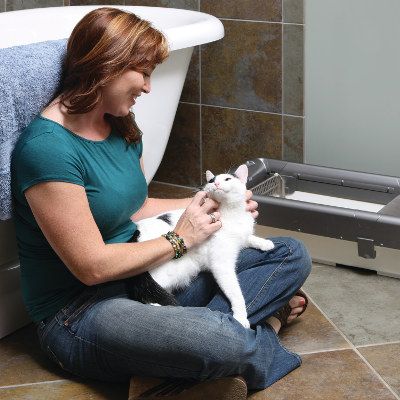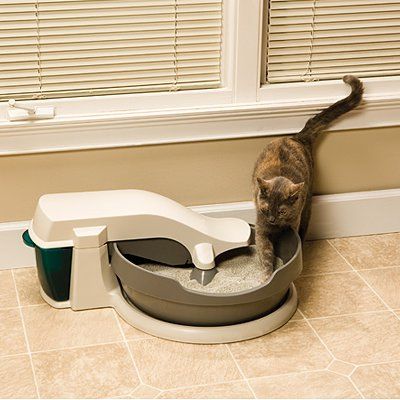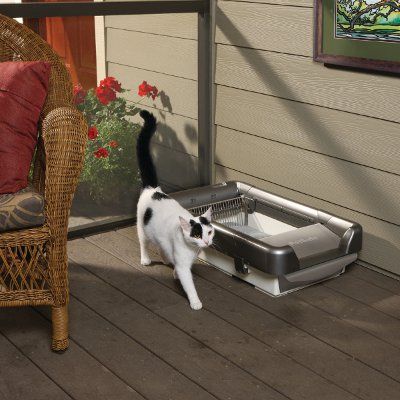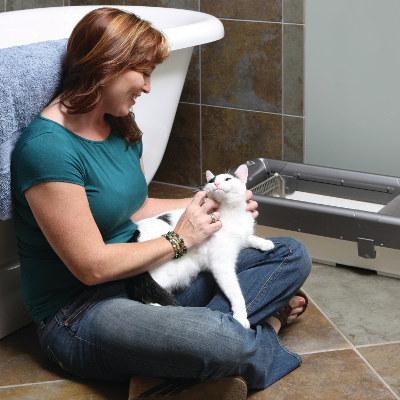 Litter boxes can be a threat to pregnant women and people without healthy immune systems. Toxoplasmosis is a common topic when discussing cats and women who are expecting, but there are a lot of misconceptions out there. Some pet owners are afraid of keeping cats in the house with a pregnant woman, when really you just need to be aware of some steps to take to keep mom healthy while she's pregnant. Let's get some facts straight about what causes toxoplasmosis and how you and your cat can stay healthy.
Litter boxes can be a threat to pregnant women and people without healthy immune systems. Toxoplasmosis is a common topic when discussing cats and women who are expecting, but there are a lot of misconceptions out there. Some pet owners are afraid of keeping cats in the house with a pregnant woman, when really you just need to be aware of some steps to take to keep mom healthy while she's pregnant. Let's get some facts straight about what causes toxoplasmosis and how you and your cat can stay healthy.
What is Toxoplasmosis?
Toxoplasmosis is caused by the parasite Toxoplasma gondii and is the reason behind pregnant women being told to avoid cat litter boxes. This parasite can cause severe diseases in pregnant women as well as people with suppressed immune systems. People can come into contact with this parasite by eating raw or undercooked meat, touching the feces of an infected cat, or transferring from infected mother to child.
 How do cats carry Toxoplasmosis?
How do cats carry Toxoplasmosis?
Although other animals can be infected with Toxoplasma gondii, cats are the only ones who shed the eggs in their poop. Cats can become infected with this parasite by hunting and eating rodents, birds, and other small mammals. Once a cat is infected, the parasite eggs leave the body in the feces. People can come into contact with Toxoplasma gondii while cleaning the litter box or by accidentally eating soil an infected cat has buried waste in.
Indoor-only cats who have no outside access and don't eat a raw meat diet can't be infected. An indoor cat could be infected in rare cases if she catches and eats a wild mouse that gets into your home or bites open a package of raw meat you leave thawing in the sink.
What happens if a person is infected with Toxoplasma?
For healthy, non-pregnant people, Toxoplasma gondii often causes no symptoms or very mild flu-like symptoms. However, once infected with this parasite, it will remain in the body in an inactive state, kept under control by a healthy immune system. Toxoplasma gondii can reactivate if the immune system becomes suppressed in the future.
This parasite causes much more serious problems for pregnant women and people with poorly functioning immune systems. Toxoplasmosis in pregnant women can lead to miscarriages, stillborn births, and birth defects. For people with suppressed immune systems, such as those with HIV or chemotherapy patients, Toxoplasma gondii can cause fever, headaches, and neurologic problems.
Is toxoplasmosis seen in the U.S.?
Yes. According to an estimate by the U.S. Centers for Disease Control and Prevention, 22.5% of the people in the U.S. 12 years old and over have been infected with this parasite. The March of Dimes estimates that between 400 and 4,000 babies are born each year in the U.S. with toxoplasmosis. This disease is more common in areas with hot and humid climates.
 How can the risk of infection be reduced?
How can the risk of infection be reduced?
- Never eat raw meat.
- Thoroughly cook all meat to recommended temperatures.
- Wash all fruit and vegetables before eating.
- Avoid drinking untreated water.
- Wear gloves while gardening, and wash your hands afterwards.
- Wash your hands before eating or preparing food.
- Clean cat litter boxes every day.
- Don't feed raw or undercooked meat to cats.
- Keep all outdoor sandboxes covered.
For pregnant women or people with suppressed immune systems, take these additional safety steps.
-
 Have someone else in the household clean the litter box every day.
Have someone else in the household clean the litter box every day. - If that's not possible, wear disposable gloves and wash your hands immediately after changing the litter box.
- Keep cats indoors.
- Avoid handling stray cats or outdoor cats.
- Get an automatic litter box.
An important point about Toxoplasma gondii is that the eggs do not become infectious until 1-5 days after they are shed in cat feces. Because of this, it's important to clean litter boxes daily, and to not wait several days between cleanings! Automatic litter boxes that clean the box after your cat has used the box are a great way to keep the box clean daily without having to touch the waste.
If you have questions about toxoplasmosis, talk to your doctor and veterinarian.







